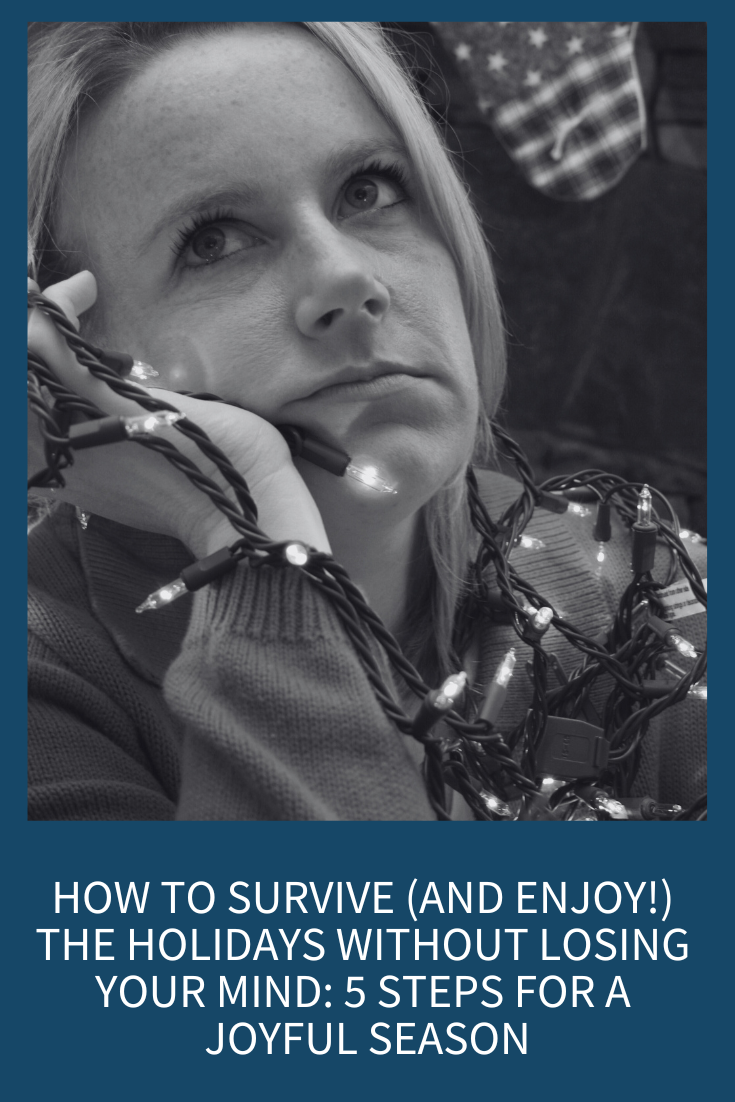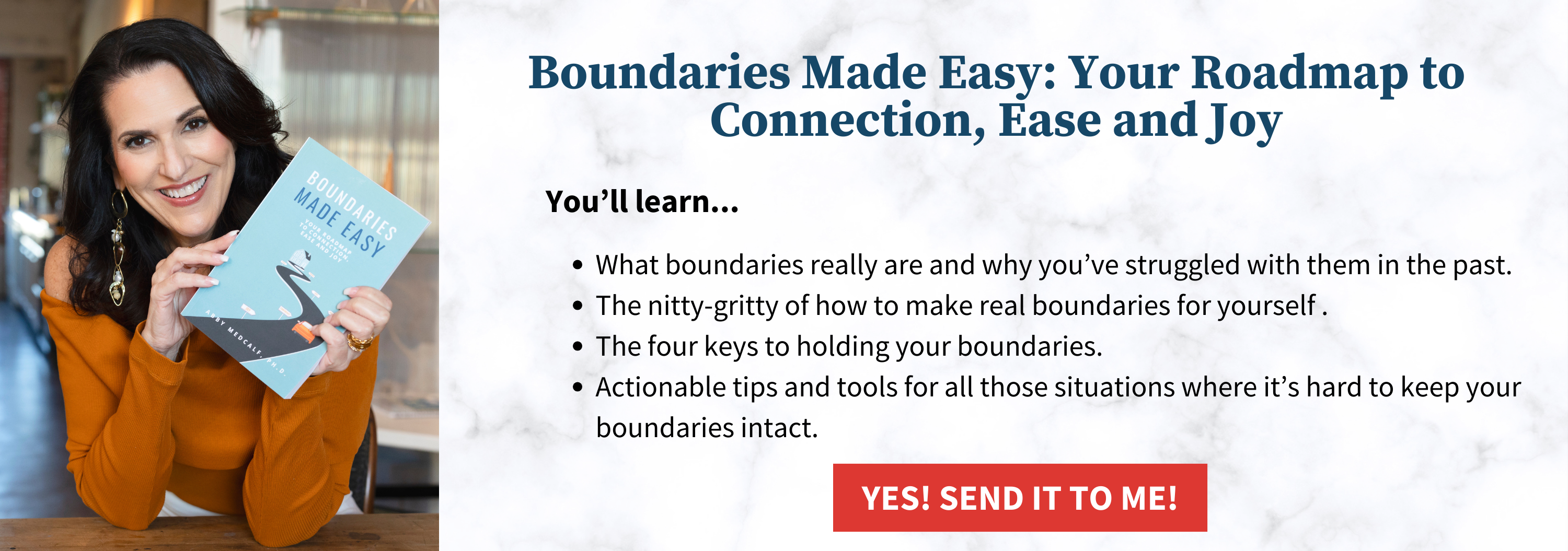
Ah, the holidays. A time of family, fun, and… overwhelm? If the thought of spending time with family or navigating the stress of the season makes you feel anxious, you’re not alone. But there’s good news! With a little planning and the right mindset, you can not only survive the holidays but actually enjoy them with my five steps for a joyful season.
8-minute read
Why the Holidays Can Feel Overwhelming
The holiday season can trigger stress for many reasons: the pressure of great gift-giving, managing travel plans, spending money you don’t have, and overindulging on booze and food. But the biggest culprit I see in my practice? Managing family dynamics.
It’s not just in your head! Research shows that family gatherings can often rekindle old conflicts, increase stress levels, and contribute to feelings of anxiety. Whether it’s your uncle making political comments at the dinner table, or your mother questioning every life choice you’ve ever made, family members can push your buttons like no one else. The good news is that you don’t have to fall into these old patterns. You can set yourself up for success with the right preparation.
Five Steps to an Awesome Holiday Season
Step 1: Set Your Intentions for the Holidays and Be the Dominant Vibration in the Room
Before the season begins, it’s crucial to get clear on how you want to feel during this season. I’ve chatted a lot about the effectiveness of this simple solution, and there’s no better time than now to start consciously setting your intentions. Although the real bang for your buck comes when you set an intention in the moment, such as right before walking into a party or when you arrive at your parent’s home, the first step is keeping your intentions front and center when you’re making decisions and plans for the holidays.
Whenever a thought about the holidays hits you, or you notice that you’re getting anxious as you make plans, stop and set your intention: I want to feel connection, joy and ease with my family. I want to feel relaxed and enthusiastic about traveling and preparing. Studies show that having clear intentions improves your emotional regulation as well as your decision-making, so I can’t stress enough how game-changing this simple step is! For example, if you want to feel relaxed, make sure to schedule downtime in between events or choose only a few key gatherings to attend. Even if you’re traveling to be with family, you don’t have to do everything on their agenda.
Now’s the time to notice any fatalistic language you’re using: “Oh, but my mother is going to drive me crazy.” Or “Wrangling the kids is going to be a nightmare while we’re away.” Instead, settle your mind gently and come back to your intention. Ask yourself: What kind of holiday do I want to co-create? How do I want to feel? Then, remind yourself that you are a powerful co-creator.
As I said, you’ll also be using this technique directly before entering a party or family dinner. Right before you walk in the house or restaurant (or when you hear the doorbell if the fun is at your house), you’re going to stop, take a nice deep breath with a long, slow exhale, and remind yourself of your intention for that meal or time: It’s my intention to be warm and loving. It’s my intention to be in my moments and remember that I can take care of myself. It’s my intention to be patient and kind. It’s my intention to connect with every one I make eye contact with.
And the last piece of this step is to plan to be the dominant vibration in the room.
Step 2: Anticipate Family Dynamics (and Prepare Your Responses)
Let’s face it; there are always those family members who seem to push every button. Whether it’s the constant questioning about your job, relationship status, or why you’re not “settled down” yet, preparing for these moments is key to keeping your cool.
Research on emotional regulation shows that preparing for emotionally triggering situations helps reduce their impact. So be ready, not surprised. Set your expectations low, but keep your standards high. Plan your responses ahead of time for common family triggers. For example, if Aunt Karen always asks why you’re still single, have a lighthearted but firm response ready like, “I’m enjoying my life and focusing on what makes me happy right now.”
My other favorite response to have at the ready that works in every situation? Like if your uncle starts talking politics or if your mother wants to chat about how your partner is treating you, or your dad asks why you’re still in that dead-end job? You answer (with so much love in your heart because you walked in with those great intentions): “There are so many things I’m excited to talk to you about, and this isn’t one of them.” And then jump directly into something you do want to discuss: “But let me tell you how Max hit a home run the other day in Little League” or “And I’m so excited that I just started a pottery class. It’s something I’ve been talking about for ten years, and I’m doing it!”
Or you can ask them a question, “Now tell me all about how you’re feeling. I heard you had a little health scare recently.” Or “I want to hear all about how my niece is doing at school. I’m sad she couldn’t be here today!”
Step 3: Set Your Boundaries Proactively and Hold Them in the Moment
You know we’re not getting through any episode talking about family dynamics without me talking about boundaries. Yes, this is why I wrote a book on the subject! Boundaries are non-negotiable during the holidays. Whether it’s saying “no” to attending every event or limiting time with certain family members, it’s important to be clear on what you need and what you will and won’t tolerate before you go to an event or have people to yours.
I know you might feel guilty when you set boundaries, especially with family members, but the research shows that healthy boundaries are crucial for mental well-being and reducing feelings of overwhelm. And you’re going to need to expect that people will be upset when you hold your boundaries. You’ll do better when you expect that someone might be upset, and you practice the following:
- Remember, you’re not responsible for someone else’s reaction. Ever.
- It’s not your job to make others comfortable.
- Instead of thinking, “What can I do to make this better?” shift your thought to: “What can I think to make this better?” Then take a breath and spend a minute shifting what your thoughts are about what’s happening and come from that compassionate, empathetic place.
- Don’t lie or minimize. Be direct and clear up front: “I’m not able to attend this year, but I’ll be thinking of you” as opposed to, “I’ll do my best to be there but can’t promise anything…”
- Stick to whatever you say. Do not be swayed by the pressure of other people’s wants or desires.
Step 4: Plan Self-Care Activities
The holidays are notorious for being filled with activities that revolve around others, from family dinners to social gatherings. But don’t forget to carve out time just for you! Studies on self-care show that maintaining personal rituals and downtime during high-stress periods reduces anxiety and boosts resilience.
I know it might feel like you “have no time,” but you must put yourself first and make sure that your basic needs are met. Continue to create time for exercise, meditation, eating, etc., or whatever else you normally do for self-care. Even five minutes of meditation or deep breathing each day can help calm your nervous system and reduce holiday stress. I’d say the biggest piece of self-care to ensure you incorporate is some breaks for yourself. That could be going for a quick walk or taking a long shower or bathroom break.
Step 5: Embrace the Joy (Yes, Really!)
Amidst all the stress, don’t forget that the holidays are also about connection, joy, and celebration. Take time to enjoy the little moments, whether it’s a delicious meal, a heartfelt conversation, or cozying up with a favorite holiday movie. Focusing on appreciation in your moments will help shift your mindset and allow you to savor the good parts of the season. Practicing gratitude has been shown to improve mental health, increase well-being, and reduce stress. Make it a habit to reflect on what you’re grateful for at the end of each day during the holiday season.
Grab my FREE Mindfulness Starter Kit to make mindfulness a consistent habit in your life.
A Holiday Preparation Plan (5 Steps to Sanity)
Let’s put it all together with a simple five-step plan to prepare for a joyful, calm holiday season:
- Set Intentions: Write down how you want to feel and what kind of holiday experience you want.
- Identify Family Triggers: List potential family conflicts or dynamics that might cause stress. Prepare neutral responses.
- Set Boundaries: Decide what events to attend and how much time to spend. Communicate your limits clearly.
- Prioritize Self-Care: Schedule time for rest, exercise, and mindfulness every day.
- Practice Appreciation and Gratitude: At the end of each day, reflect on what you’re grateful for. Focus on the positive moments.
By taking these steps, you’ll be more prepared to navigate the holidays with grace, maintaining your peace and joy even during challenging family interactions.
Resources and Research for How to Survive (and Enjoy!) the Holidays Without Losing Your Mind: 5 Steps for a Joyful Season
The Secret to Happy Successful Relationships: Attention and Intention
How to Set Intentions in Just 18 Seconds (aka The 18-Second Shift)
The Secret to Positive Thinking in All Your Relationships
Calibration Exercise: Create a Positive Vibration to Start Your Day
You’ve Got to Have High Standards and Low Expectations
Boundaries Made Easy: Your Roadmap to Connection, Ease and Joy by Dr. Abby Medcalf
How to Overcome Guilt and Regret When Setting Boundaries
Why Appreciation is Different Than Gratitude
Top Five Coping Skills to Deal with Family Driving You Crazy During the Holidays
How to Get Grounded and Balanced this Holiday Season
Dealing with Judgmental and Critical People this Holiday Season
How to Stay Calm and Centered When Dealing with Family Stress and Dysfunction During the Holidays
Create Connection and Joy this Holiday Season by Doing This One Thing
How to Keep Your Boundaries Around the Holidays
The Weathervane. Hawaii Med J. 2010 Oct;69(10):254. PMCID: PMC3071181.








